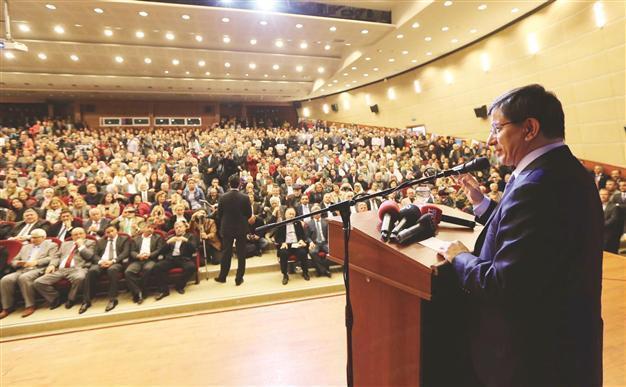Post-Geneva process should be monitored by UN peace force: Turkey suggests
ADANA – Hürriyet Daily News

Turkish Foreign Minister Ahmet Davutoğlu proposes that Western powers and Arab countries either establish a peace force or a UN mission in order to closely control and monitor the implementation of the post-Geneva process. AA Photo
The international community should make clear to the Syrian regime and the opposition that non-compliance with potential conclusions of the Geneva II conference will lead to sanctions, the Turkish foreign minister has suggested, proposing that Western powers and Arab countries either establish a peace force or a U.N. mission in order to closely control and monitor the implementation of the post-Geneva process.“Success would come [in the Geneva talks] if the parties are sincere and a decision for the establishment of a Syria Transitional Government is taken and [in the case of an agreement over] sanctions to be imposed when necessary,” Foreign Minister Ahmet Davutoğlu told a group of reporters yesterday.
The much-anticipated Geneva II conference is expected to take place this week in Montreux with the participation of prominent Western and Arab countries. The Syrian regime and the opposition will meet for the first time since the turmoil begun in March 2011. Hopes to find a political solution and establish a transitional body are increasing with Russia and Iran’s contributory approaches, but there are still questions regarding the fate of Bashar al-Assad, Syria’s defiant president. With days left to the meeting, international diplomatic traffic has also intensified, with the Turkish and American foreign ministers, Davutoğlu and John Kerry, exchanging phone calls on an almost daily basis.
The transitional government should have full executive power in Syria, Davutoğlu stressed, emphasizing the need for a U.N. presence on the ground to monitor and report the implementation of the potential agreement at the Geneva conference slated for Jan. 23 and 24. “If they reach an agreement, the U.N. should be on the ground after taking a U.N. Security Council decision for control and monitoring the agreement so that the integrity of Syria would be ensured,” Davutoğlu said.
Upon questions on sanctions, he cited other major disputes in which the U.N. intervened by either sending a peace force or deploying a U.N. mission. “What I mean by sanctions is that non-compliance with the agreement will have a response, so none of parties will consider disobeying the agreement. Barrel bombs are being used today, as the use of chemical weapons did not lead to sanctions. The U.N. should stop this ethnic cleansing,” he said.
Davutoğlu also stressed to the international community that the Geneva talks risked failure if the Syrian regime continues its military attacks against its people in a move to eradicate the Syrian opposition, while an international effort to find a political solution to the problem is underway.
The Syrian opposition announced its decision to participate in the upcoming Geneva II peace conference in consolidated and endorsing decisions of Geneva I, the minister said, expressing his congratulations to the Syrian National Coalition. The Syrian opposition will represent almost all ethnic and religious groups in Geneva II meetings and that will represent a picture of an integrated Syria, Davutoğlu said, adding that he was hoping the conference would also change the “psychological effects” in the turmoil-ridden country in order to open up a new way to end the clashes.
On questions about the roles of different actors on the ground, Davutoğlu accused the Syrian regime of being in a “hidden cooperation” with both al-Qaeda and the Democratic Union Party (PYD), an armed Kurdish group that has ties with the Kurdistan Workers’ Party (PKK). The PYD’s non-participation in the Geneva II conference was not an issue for Turkey, Davutoğlu said, recalling that Ankara issued constant messages to this group to clarify on whose side it will stand. He said the PYD preferred to enhance its cooperation with the Syrian regime and had allied with it in a more coordinated way after al-Assad’s army used chemical weapons against civilians.
Elaborating on the ongoing fight between the Free Syrian Army and al-Qaeda affiliated groups near the Turkish-Syrian border, Davutoğlu sought to emphasize that Turkey was not a part of those clashes. He said allegations that Turkey gave support to al-Qaeda were “psychological moves” against the country.
Any form of instability in Syria will have effects on Turkey, he also added. “That’s why we see great advantage to the FSA and affiliated groups taking the control in the north of Syria after the regime loses its control in that area. Claims that Turkey is supporting terrorist groups in Syria are merely manipulations. Turkey is fighting against al-Qaeda. We are closely following developments on the border,” he said.
















